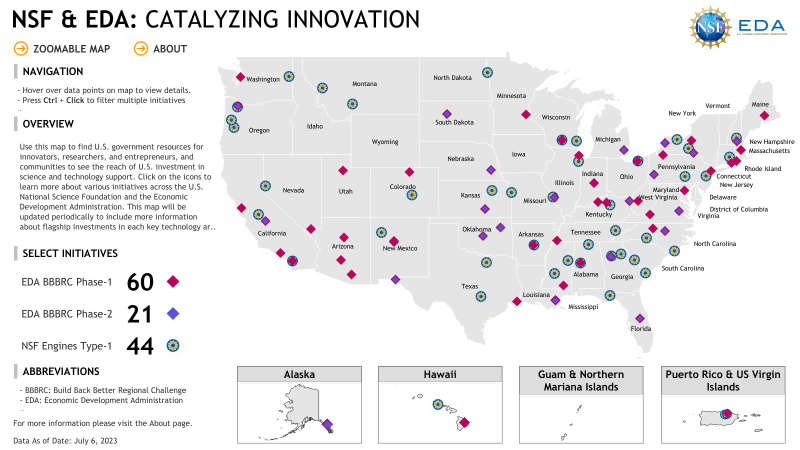The U.S. National Science Foundation and the U.S. Economic Development Administration (EDA) signed a memorandum of understanding to officially enable cross-agency coordination on regional innovation programs.
"Innovation and collaboration go hand in hand, so it's fitting that EDA and NSF continue to lead by example as we forge new opportunities to share resources and foster a new age of technological advancement,"
NSF and EDA share a mutual commitment to regional innovation and economic development in communities across the nation. The "CHIPS and Science Act" authorizes both agencies to implement programs to enable regional technology development and economic and job growth through the NSF Regional Innovation Engines (NSF Engines) and the EDA Regional Technology and Innovation Hub (Tech Hubs) programs. Collectively, these programs - along with many of the agencies' other investments, like EDA's Build Back Better Regional Challenge awards - will accelerate technology advancement and commercialization, innovation and entrepreneurship, job creation and workforce training, and more. Ultimately, these programs will contribute to regional economic growth and U.S. competitiveness in key technology areas. View a map of various NSF and EDA initiatives.

The NSF-EDA memorandum allows for the coordination of specific projects, programs and facilities. The coordination may include research and education activities, facilities, centers, data infrastructure and outreach. Ongoing areas of cooperation as well as future areas of potential cooperation could include:
- Implementing pathways for sustained growth of regional innovation ecosystems.
- Training and educating diverse technicians, researchers, practitioners and entrepreneurs based on regional workforce needs.
- Forming trusted partnership networks across industry, academia, government, nonprofits, civil society and communities of practice to foster scientific innovation and the exchange of proposals or personnel.
- "Given the complementary nature of both programs, this partnership allows for synergistic and collaborative activities to create opportunities everywhere and drive innovation anywhere," said Erwin Gianchandani, NSF assistant director for Technology, Innovation and Partnerships. "By working closely with EDA, the research and development outputs from NSF Engines could scale at a pace that will keep the U.S. competitive in key technology areas and more quickly address critical national, societal, and geostrategic challenges."
The NSF Engines program uniquely harnesses the nation's science and technology research and development (R&D) enterprise and regional-level resources. NSF Engines aspire to catalyze robust partnerships to positively impact the economy within a geographic region, address societal challenges, advance national competitiveness and create local, high-wage jobs. NSF Engines R&D activities across distinct geographic regions will result in innovations that can in turn fuel economic growth and the production and delivery of new technologies in regional ecosystems strengthened by EDA's Tech Hubs investments. To see a list of 44 NSF Engines Development Awards or a list of NSF Engines semifinalists, visit Regional Innovation Engines.
Tech Hubs program investments leverage existing R&D and technology deployment capacities but do not directly fund R&D. The program is intended to advance the capacities of places to manufacture, commercialize and deploy these technologies. Tech Hubs will operate across the country by bringing together industry, academia, state, local and tribal governments, economic development organizations and labor and workforce partners to supercharge ecosystems of innovation for technologies that are essential to U.S. economic and national security.
"Innovation and collaboration go hand in hand, so it's fitting that EDA and NSF continue to lead by example as we forge new opportunities to share resources and foster a new age of technological advancement," said Assistant Secretary of Commerce for Economic Development Alejandra Y. Castillo. "Programs such as EDA's 'Tech Hubs' and NSF's 'Engines' will make focused investments in innovation and technology that leverage assets in regions throughout the United States to make our nation safer, stronger and more competitive on the global stage. Together we will ensure that the innovations, industries, and jobs of tomorrow start, grow, and remain in the United States."
About the U.S. Economic Development Administration






